“…when he had conquered well, the women were the true winners, for he devoted himself to our pleasure with the intensity of a vocation. Indeed he believed fervently in female pleasure, thinking it greater than his own.” ( M.R. Lovric )
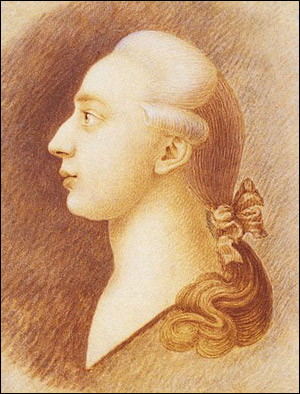
"I saw that everything in the world that is famous and beautiful, if we rely on the descriptions and drawings of writers and artists, always loses when we go to see it and examine it up close." (from Histoire de ma vie, 1966-71)
In part, the fascination with Giacomo Casanova (1725-1798) masks a contemporary yearning dressed up in the clothes of historical fiction. Casanova’s appeal is multi-layered and that enchantment with him cuts across the gender divide. Women can perceive him as a symbol of feminism and emancipation, and men, in a less celebratory manner, can secretly rejoice in the traditional notion of him as an unfeeling predator, and slightly envious in a Walter Mitty sort of way, in voyeuristically recreating his exploits as an occupation of the imagination. Casanova was a master of self-invention, who did not seem burdened by moral regulation, and had little interest in wealth and power. He enjoyed performing whatever role the situation required and his memoirs are absent on moral judgments about himself and his peers. Eloquent, self-confident and fashion-conscious, he spent most of his life outwitting social controls of any sort; Casanova reminds us that there is more to life than restraint and self-discipline.
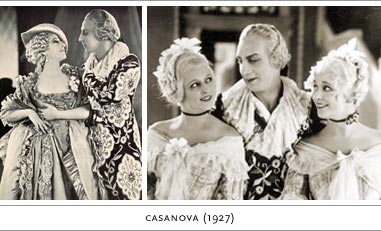
Casanova (1927) Also known as Casanova, the Prince of Adventure and The Loves of Casanova France, Black and White and Color, Silent Directed by Alexandre Volkoff Screenplay by Norbert Falk, Ivan Mosjoukine and Alexandre Volkoff
He apparently bedded between 116-134 different women in his life.There is little doubt that Giacomo Casanova was a charlatan par excellence. He was a composite of a number of compelling archetypes of fiction and was present during many of the key moments of late-18th-century history, encountering Voltaire, Mozart, Rousseau and Benjamin Franklin along the way, as well as Pope Clement XIII, Louis XV, Madame de Pompadour and Catherine the Great. If he hadn’t existed, an Italian director would have invented him. What distinguished Casanova from the usual run of crass seducing rakes lay in the nature of his encounters: He was not merely seeking out sexual conquests; he was also pursuing love affairs. He was a sensualist, and a genuine romanticist who was also attracted to women’s intellectual charms, even if a large percentage would be considered jail bait today. Also, he frequently fell in love; it was conquest of the benevolent kind which set him apart from the cinema cliches of a lecher in knee breeches that he is stereotyped as.
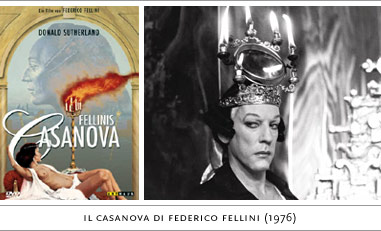
Il Casanova di Federico Fellini (1976) Adapted from the autobiography Histoire de ma vie Also known as Fellini's Casanova (USA) Italy, U.S.A., Color Directed by Federico Fellini Screenplay by Federico Fellini and Bernardino Zapponi
”But what makes Casanova most attractive today is that we see in him the prototype for the modern picaro who floats from city to city and scene to scene, collecting life experiences and flirting with various careers, relationships and spiritual-belief systems. Casanova himself was a cabalist, Freemason magician and Catholic abbot. His successors may be found traipsing the world circuits from Punta del Este to Salzburg, from St. Moritz to Sydney, carrying their yoga mats, polo mallets, surfboards or laptops. They are the ultimate slashies: model/D.J./advertising exec/Web creative/croquet pro/private banker. And they experiment with relationships and sex roles, from boy toy to breadwinner, from date-to-the-ball to tantric-sex partner. Intellectually, they are the heirs of the theoretical buzzwords of the 1980′s: ”pastiche,” ”masquerade,” ”nomadism” and ”seduction” (which the sociologist Jean Baudrillard described as an equal and opposite force to productiveness — the impulse that leads us astray). Though the character of Casanova is a perfect template for the Wallpaper generation, his memoirs do continue to shock the contemporary reader — not because of how many he took to bed, but because of how few. ” ( Ben Crawford )
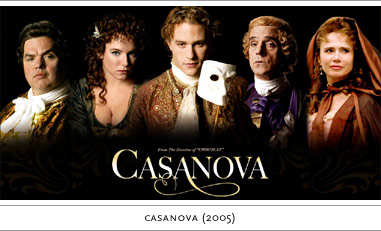
Casanova (2005) USA, Color Directed by Lasse Hallström Screenplay by Jeffrey Hatcher and Kimberly Simi Cast: Heath Ledger - Casanova
…The beginning of September 1763, had marked a climacteric in Casanova’s history. Never again was he to be quite the same man. As he reviewed those story, frustrating months in his Memoirs, he felt that on a certain calamitous autumn day, he had in fact begun to perish. ”It was on that fatal day… that I began to die and ceased to live.” Looking back, he saw a process of gradual decline: the reverses he had undergone in London, ” which ended the first chapter in my life”, had led directly, through his final period in Venice where he had earned a meager pittance as a government spy, to the miserable seclusion he now endured at Dux, scribbling and yawning and regretting his vanished youth, amid Count Waldstein’s serried folios. At Dux he was entering the third chapter, which could only end with death. ”The comedy will then have run its course… If the audience should chabce to hiss, I very much hope that there will be nobody to bring me the news”.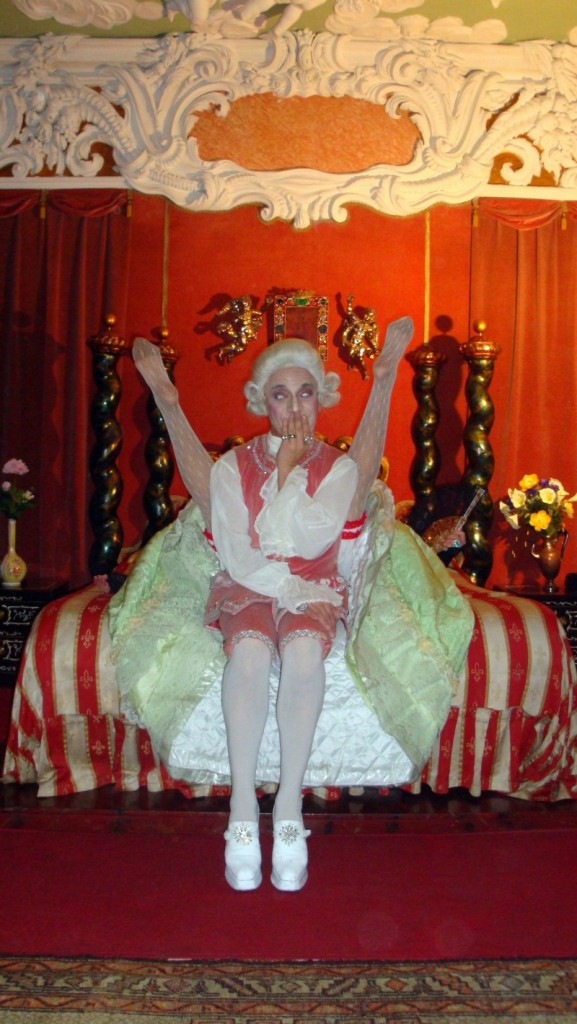
Meanwhile he could neither excuse his failure nor find an explanation of its inward causes. Had he himself, conceivably, ”willed” his downfall? Say, in the same way as Rene Chateaubriand. Love was a notorious source of folly, and he was obliged to confess that he had loved beyond all reason. Casanova was still vigorous, resourceful, and well provided with money; he possessed an abounding personal charm and had a lengthy experience in the management of women. On English soil, however, none of these assets could save him from humiliation.It was the only place where a weoman ever said ”No” to him, and the experience unsettled him for the rest of his life. Yet the early stages of his visit showed Casanova in his most aggressive mood.
Although his scheme for a legitimate national ottery never materialized, owing to the unexpected removal of his chief supporter in the government, he soon hired an expensive furnished house and, since English tavern fare was rich but unappetizing, engaged an admirable French cook. He spent his money in a judiciously prodigal manner. His Pall Mall resid
alone cost him more than twenty pounds a week.
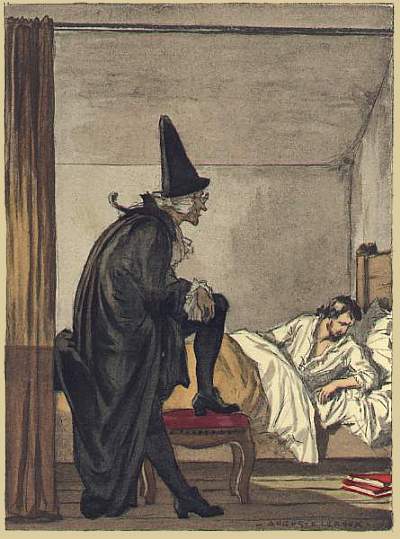
From this base Casanova proceeded to conduct three major amatory campaigns of which the first and third were brilliantly successful, but the second ended in an ignominious rout. Each shows him in a different aspect. Thus, his brief liaison with the aristocratic Portuguese girl whom he calls Pauline X———–o , but who is otherwise unidentifiable , reveals him as a tender , thoughtful and imaginative lover, while his treatment of the ”Hanoverian women” , an impoversihed widow and her five daughters, all of whom he presently enjoyed, displays him at his least attractive. He played on their fears, exploited their poverty, and swept aside their forlorn pretensions to virtue.
Between these episodes, one romantic and sentimental, the other harshly cynical, Casnova inserts a tragi-comic account of his association with La Charpillon and her family. At first sight there was nothing to distinguish the seventeen year old Marianne Charpillon from a host of young women he had met and conquered. Her mother and grandmother, descendents of an honest Swiss pastor, had both been minor demimondaines , listed in the secret archives of the French police; and, while they were living abroad,Casanova had already met them.
The Charpillon’s had since left Paris and settled down at a modest house in Denmark Street, Soho, whither their confederates, a gang of petty cardsharps, lured the victims they meant to pluck. The Charpillons had many acquaintances among the alien population of the city, and it was M. Malingan, a Flemish soldier of fortune , who presented the Italian tourist to madame Charpillon and her daughter.
Marianne Charpillon at once aroused his desire, which presently merged into a much deeper feeling, for not only was she witty and seductive but to a sharp mind and engaging manners she added conspicuous physical attractions. She was, indded, he thought, a grat beauty, with her light chestnut hair, azure eyes, dazzling white skin, small but perfectly formed breasts, long dimpled hands, and tiny feet. He wrote, ” Her physiognomy , which was gentle and candid looking, suggested a soul noble for delicacy of sentiment”; and she possessed moreover, that air of distinction which is usually associated with patrician birth. Here Nature lied, says Casanova bitterly. She was neither delicate nor well bred: ”This girl had conceived the plan of making me wretched even before she really got to know me; and, what is more, she told me so”. It was said that Casanova, in his restless wanderings from one women to another, was always trying to find the mother he never had:
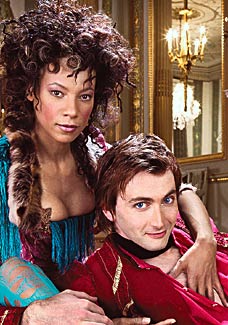
David Tennabt. ''There was no more perfect picture of piety than the tall, slender young nun in her simple white habit and gold cross. Yet from the moment she saw the handsome young man across the chapel of the convent on the island of Murano, her vow of chastity went out of the window into the Venetian lagoon. Read more: http://www.dailymail.co.uk/femail/article-404782/
”Casanova’s working-class mother was born Zanetta Farussi, the daughter of a poor but respectable Venetian cobbler. When she eloped with Gaetano Casanova, an actor from a local theatre, she broke her parents’ hearts. For though the city’s seven theatres were owned by noblemen, actors were considered social outcasts, and actresses little better than whores. The prospect of his beautiful daughter joining their ranks horrified Zanetta’s father so much that he died supposedly of grief within a month of her wedding. Born into the despised milieu of the theatre on April 2, 1725, Giacomo Girolamo Casanova was the first child of this controversial marriage. Although he would later pass as a proud aristocrat in the capitals of Europe, the stigma of his humble beginnings never left him, and his relationship with his mother only exacerbated his feelings of inferiority.
From the start, she paid him little attention. When he was just 10 months old she left him with her own mother and followed her husband to London, where he had been engaged to work with an Italian commedia dell’arte troupe in the Haymarket. Here Zanetta fulfilled her parents’ worst fears by joining the profession herself and, it was rumoured, having an affair with George Augustus, Prince of Wales and the future George II, who was said to be the father of her second child, Francesco.
Zanetta developed into a talented actress who inspired Italy’s most famous playwright, Carlo Goldoni, to write a play about her. But her mothering skills were distinctly lacking. When she returned to Venice, she virtually ignored Giacomo, who in her absence had become a withdrawn, imbecilic and sickly infant prone to gushing nosebleeds. When, in 1733, 36-year-old Gaetano Casanova died of a brain tumour, he left his wife with five young children to support and a sixth on the way. On the night of his ninth birthday, Zanetta took Giacomo to Padua, dumped him at the home of a cruel harridan she had never met before – supposedly for the good of his health – and walked out of his life to pursue her acting career at home and, later, in St Petersburg and Dresden.” ( Judith Summers )



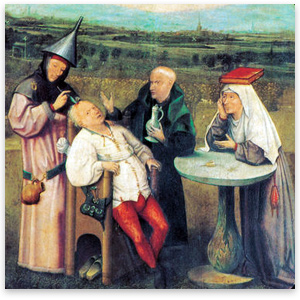




 COMMENTS
COMMENTS



